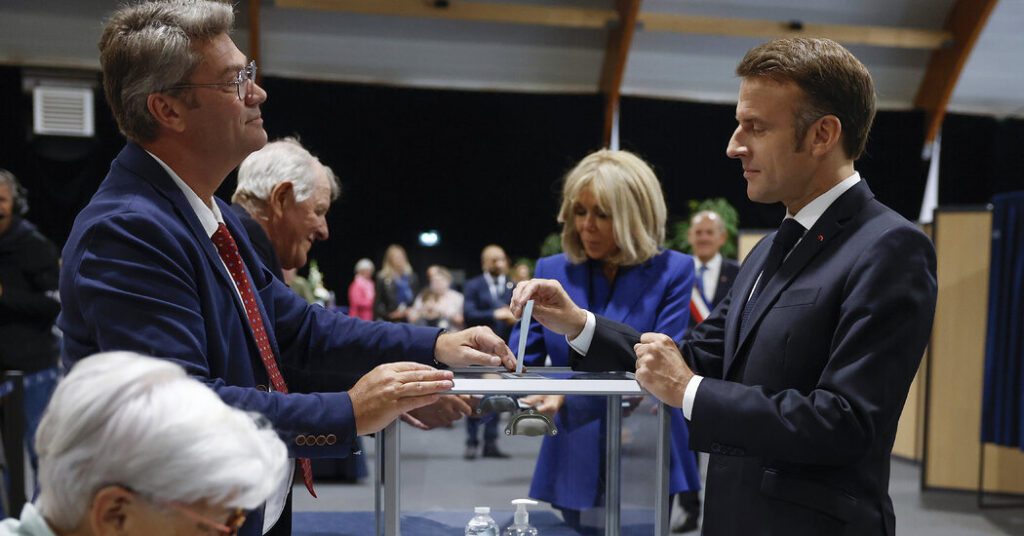One factor was clear after France’s shock election outcomes on Sunday: Any new authorities fashioned by President Emmanuel Macron would face months of political paralysis. What’s much less sure is whether or not that gridlock will tip France’s closely indebted financial system additional into misery.
The turmoil has centered consideration again on France’s ballooning €3 trillion debt and a deficit that has grown to greater than 5 p.c of financial output, and instantly prompted a warning on Monday from the Normal & Poor’s scores company over France’s sovereign debt ranking.
“Uncertainty hangs over France’s future authorities structure,” stated the company, which had already downgraded France’s debt ranking on Might 31, rattling the federal government, whose financial credibility has been one in every of its fundamental political belongings. Ought to the polarization of France’s new Parliament weaken the federal government’s capability to fix its funds, France’s debt could possibly be downgraded once more, it added.
France is going through uncharted territory after left-wing events surged unexpectedly in nationwide legislative elections, eclipsing the nationalist, anti-immigration Nationwide Rally social gathering to safe essentially the most seats within the decrease home of Parliament. The consequence left no social gathering — together with Mr. Macron’s centrist coalition — with a majority and has splintered the decrease home of Parliament into three bitterly antagonistic blocs.
The French financial system was already in a tough patch. Unemployment, which fell final yr to a 15-year low of seven p.c, has ticked again up as producers curb manufacturing and exports gradual. Shoppers, weary from persistent inflation, had additionally minimize spending, a key driver of development.
Mr. Macron’s authorities lately warned that development can be weaker than anticipated this yr because it appeared to chop spending by greater than 20 billion euros (about $21.5 billion). The European Union reprimanded France late final month for breaching fiscal guidelines that prohibit spending and borrowing. France’s debt has climbed to greater than 110 p.c of financial output, and it has a deep finances deficit after the federal government spent closely to defend customers and companies from pandemic lockdowns and excessive power costs.
Mr. Macron’s opponents on the best and the left seized on the debt to assail him throughout their campaigns. However the main events are in no temper to succeed in consensus, and traders are anxious that the brand new Parliament will fail to cross a finances within the autumn that would come with main spending cuts and keep away from the chance of additional downgrades to France’s sovereign debt.
“As soon as the mud has settled, the impasse of a hung Parliament will show extra damaging than first implied,” Alex Everett, funding supervisor at Abrdn, a London-based funding firm, wrote in a observe to purchasers. “France’s finances issues haven’t disappeared. Macron’s try and power unity has as an alternative fueled but extra discord.”
Traders had already pushed up the federal government’s borrowing prices. The distinction between the rate of interest that traders are charging on French debt versus that of Germany has elevated to the most important hole for the reason that monetary disaster, an indication that traders are anxious about France’s capability to handle its funds. The hazard is that France’s debt grows even bigger, which might result in a sooner rise in curiosity funds.
Complicating the image is the left-wing alliance, the New Widespread Entrance, which on Sunday received essentially the most seats within the decrease home of Parliament. The social gathering, a bloc that features Communist, Inexperienced and Socialist lawmakers, is pushing a heavy “tax the wealthy and unfold the wealth” agenda impressed by the far-left France Unbowed social gathering, and has stated it is able to flout European Union fiscal guidelines if needed to hold out its platform.
Certainly, except the federal government raises taxes on companies and the wealthy, the leftist bloc is more likely to reject a nationwide finances that honors France’s pledge to Brussels and debt scores companies to chop the deficit subsequent yr to 4.4 p.c of gross home product, from 5.1 p.c, Mujtaba Rahman, the managing Europe director for the Eurasia Group, wrote in an evaluation. The group may also search extra spending on schooling and well being care and presumably push to extend France’s minimal wage, he stated.
However the leftists, whereas emboldened, will lack general management, so their agenda has little prospect of approval. That has eased fears amongst some traders in regards to the financial price of the New Widespread Entrance’s spending program. The estimated price can be as excessive as €187 billion yearly, a complete that will be supported by as much as €150 billion in elevated taxes for companies and rich people, and scrapping a wide range of company tax breaks.
“A hung Parliament is probably going the most effective answer for European equities,” stated Claudia Panseri, chief funding officer for France at UBS World Wealth Administration.
On Monday Mr. Macron’s finance minister, Bruno Le Maire, warned in a publish on X that the leftist bloc’s financial program might tip France right into a monetary disaster and financial decline. “It might destroy the outcomes of the coverage that we now have pursued for seven years and which has given France work, attractiveness and factories,” he stated.
Holger Schmieding, chief economist at Berenberg Financial institution, stated the legislative logjam “spells the top of Macron’s pro-growth reforms.” As a substitute, he stated, Mr. Macron’s centrist coalition will most likely have to simply accept the reversal of a few of its signature initiatives — presumably together with his transfer to extend France’s retirement age to 64 from 62, which led to nationwide demonstrations in 2022.
In the long run, Mr. Schmieding added, such reversals and disfavor amongst international traders are more likely to scale back development and lift inflation in France. “Coupled with the potential credit standing downgrades, this may elevate financing prices and exacerbate France’s fiscal woes,” he stated.



